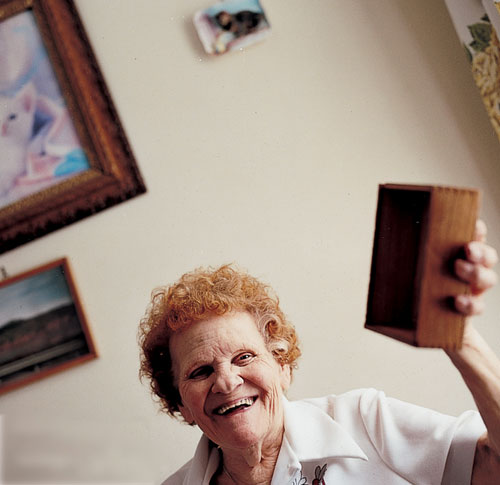Message In a Box
It’s been said many times that Yankee stories are different than other kinds of magazine stories. We hear that a lot from our readers, but it also resonates with the people who work at Yankee, too. We don’t do exposes, take down pieces, or big celebrity interviews, let alone Best Docs packages. Our stories have […]

It’s been said many times that Yankee stories are different than other kinds of magazine stories. We hear that a lot from our readers, but it also resonates with the people who work at Yankee, too. We don’t do exposes, take down pieces, or big celebrity interviews, let alone Best Docs packages. Our stories have tension, but we also write with admiration for New England and the people who call it home.
The story of Pauline Niskanen is a good example of that. I’d been at the magazine just a few months when a letter from a longtime subscriber landed on my desk. I’ll be honest: Story pitches and story ideas from readers come to us all the time. And despite proclamations like “The Perfect Yankee Story!” these suggestions are often far from that. This was a rare exception. Pauline, now 84 and living in Troy, New Hampshire, a run down mill town just 20 minutes from Yankee‘s offices in Dublin, had rarely ventured outside the state. And yet, in a wonderfully unconventional way she’d managed to develop friendships with scores of people from around the country. Long before the advent of Internet and chat rooms, Pauline, who worked on the assembly line at a box factory in nearby Keene in the 1940s, scribbled her name and address on the bottoms of the cheese, chalk, and codfish pine containers she helped create.
Pauline was tentative about a story when I first pitched it to her on the phone. “I don’t know why you want to write about me,” she kept saying. But I finally got her to come around to letting her meet me and show me the letters. She had just one rule: I needed to make a visit work around her soap opera schedule. I told her it wasn’t deal breaker, and so, one early October morning in 2000, I made my way to her apartment, a cozy, neatly kept place on the second floor of a tired apartment building located just outside of downtown Troy. On her walls were brightly colored paintings of kittens and puppies. Pauline, who was short, with red curly hair, made me coffee in her kitchen and then after a few minutes of chit-chat retrieved her letters, which she neatly kept rubber-banded in a plastic bag in a bureau drawer.
The correspondence was more than I could have hoped for. Like a message in a bottle they’d arrived, some people looking for friendship, others seeking something more. “I have been carrying around your box around with me since I found it,” wrote one lonely bachelor from South Carolina. “I only wish it was you.” Another heart-struck man from Brooklyn, New York wrote: “I’ve got a 1939 Buick Convertible Coupe. It’s bright red and really pretty.”
Soon, Pauline and I were writing back and forth. Her letters would arrive at Yankee, where on occasion, around her soaps schedule of course, she’d call me up, breaking into conversation with a “Hey, honey.” When I could, I’d visit her, too. She’d have a snack and coffee ready for me when I arrived, and we’d take our seat in her living room, where she’d deliver the latest gossip floating around her apartment building and I’d keep her up-to-date on my upcoming wedding.
Life had tethered Pauline to a specific, small geographical range. But her curiosity about the world was never stymied by it. She told how she’d longed to maybe move to Florida when she was younger, see other parts of the country, but her husband never matched her interest. She asked me about the places I’d traveled to, what I’d eaten and where I’d gone.
On one particular visit, after I’d gotten married, I showed her a picture of my wife, Grace. I was little nervous about it. Grace is African-American and I just wasn’t sure how Pauline would greet the idea of an interracial marriage. When I gave her a picture I carried around in my wallet, Pauline looked at it hard for a few seconds, before nodding her head with approval. “That’s alright,” she said. “That’s alright!” she added again, looking at with me with a big smile. Later I brought Grace with me for a visit and the two hit it off like old friends.
In the fall of 2002, my contact with Pauline had become more sporadic. For several months, I didn’t hear from her. Then, in late winter of 2003 I received a letter from her son, who now lived in California. He wanted to let me know that his mother had passed away. He also wanted to thank me for being her friend.
Every now and again I go back to that little story I did on Pauline for Yankee. I’m grateful I got the chance to meet her. I’m grateful I got the chance to introduce her again to the world.


